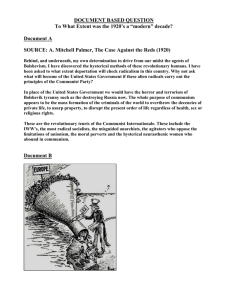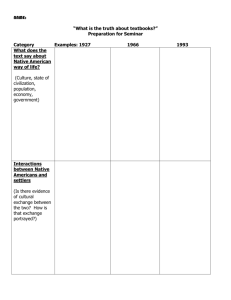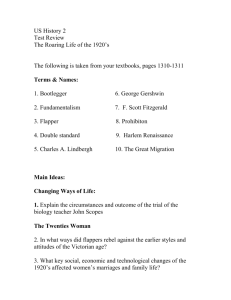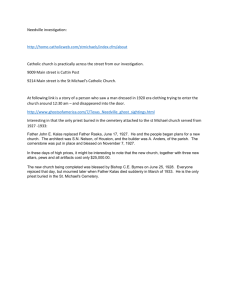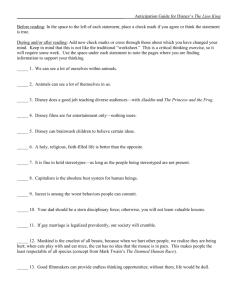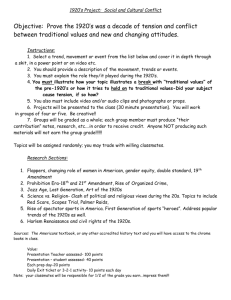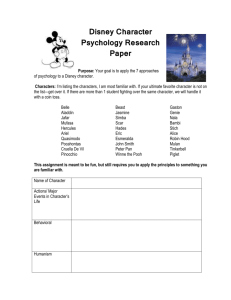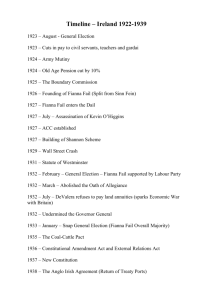Jack Dempsey
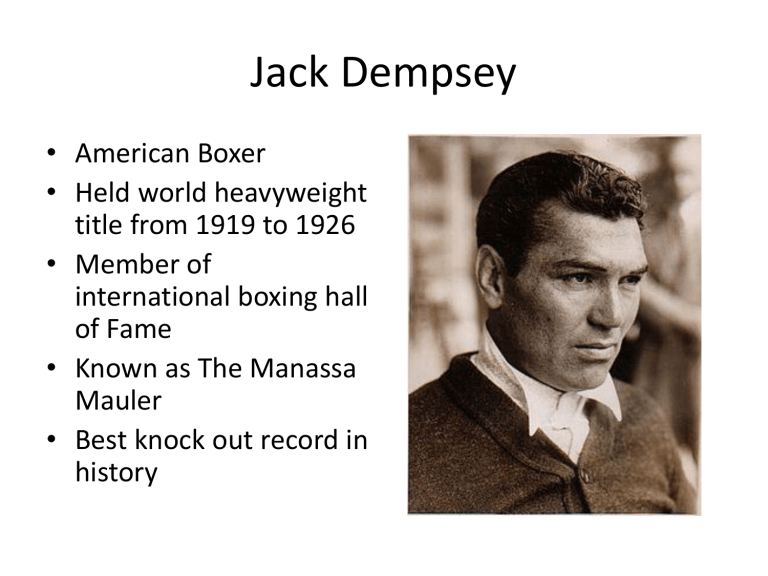
Jack Dempsey
•
American Boxer
•
Held world heavyweight title from 1919 to 1926
•
Member of international boxing hall of Fame
•
Known as The Manassa
Mauler
•
Best knock out record in history
Ernest Hemmingway
•
Famous American author
•
In 1927 he wrote his first book A Farewell To
Arms from his experiences in World
War I
•
Went on to create famous novels like The
Old Man and The Sea
Chain Stores: Marissa Silverman
• National Tea
• A&P
• Kroger
• National Tea was Chicago based and had around 550 stores in 1928
• Macy’s of New York was the biggest department store in 1924
• Stores mostly identified with the cities they were from
• Filene’s of Boston
• The primary gift shopping time was
Christmas
– Department stores made it their own by putting Santa in the front, etc.
– Advertisement writer for
Montgomery Ward wrote
Rudolf the Red-Nosed
Reindeer
- Won his first tournament at the age of 6
- Won the Southern Amateur in
Atlanta
- Opened the Augusta National
Golf Club in Georgia in 1933
- Introduced the Masters
Tournament
- At 14, Jones won the Georgia
Amateur tournament and reached the quarterfinals of the
U.S. Amateur at Merion Cricket
Club in Haverford,
Pennsylvania
Knute Rockne
• Notre Dame football coach
• Primary creator of modern football
• Changed the spectator's connection to the game
– made the play more visible to large crowds.
– He produced athlete-heroes so that audiences could cheer and could identify them.
• Popularized the forward pass
• included many features common in modern passing, including having the passer throw the ball overhand and having the receiver run under a football and catch the ball in stride.
• Notre Dame upset Army, 35-13, at West
Point.
• The game played an important role in displaying the effectiveness of the forward pass and "open offense" and it convinced many coaches to consider adding a few pass plays to their play books.
Radio in the 1920s
• Radio became know with the historic broadcasting of KDKA news station which was one of the only radio stations at the time
• 60% of American families purchased radios
• By 1922 there were over 600 radio stations
• Manufacturers were instantly overwhelmed by the popularity of the product, there were lines around the corner to fill out order forms.
• More dependable and affordable after WWI
• Eight million passenger cars were driven on the roadways
• Henry Ford was the creator of the cars
• Big Three of Ford, General Motors, and
Chrysler made up 70% of all new car sales
• Automobile manufacturers made enormous sales through planned obsolescence, advertising, and seductive installment plans.
• Automobile production helped increase the growth and development of related industries.
• Cars allowed farm families to make trips to town which resulted in the closing of many rural stores, churches, and schoolhouses.
George Gershwin By Kyle Sorreta
• Classical music composer from Brooklyn
• Famous for writing
Rhapsody in Blue and An
American in Paris
• His music became popular in the US and
Europe
• He was rejected by many instructor tutors
• Worked with Fox Film corporation in 1929
Leopold and Loeb
• Nathan Leopold- University of Michigan & Richard
Loeb- University of Chicago
– Desire to commit a perfect crime.
• Kidnapped and killed Richard Franks (Loeb’s cousin)
– Trill of the experience
– For a ransom of $10,000 (never actually obtained)
Flappers
• F. Scott Fitzgerald described flappers as young girls who wore unblocked galoshes that would make a flapping noise as they walked.
• Corsets went away, allowing the women to move freely.
• Outfits were skimpier, lost of fringe!
• Hair styles were now changed to short “bob” hair cuts
• Flappers started wearing makeup: powder, eyeliner and lipstick became very popular
• Before flappers, only men smoked; this was the beginning of women smoking
– Women would also drink, it was not uncommon to see women with flasks full on hand.
• Flappers had a very scandalous image
• During this time, automobiles were a faster way of traveling and becoming more popular
– Many of theses women would drive these fast cars
Helped make baseball exciting With his Homerun proficiency.
Won 7 Pennants and 4 world series with the yankees.
Introduced high scoring games to baseball in the
1920s.
Hit 60 homeruns in one season, the record until
1961.
Was given very limited playing time and still managed to hit numerous homeruns in his early years.
Gave a lot of money to charity regardless of his reckless lifestyle
Larger than life figure to new york baseball fans in the 20s
Babe Ruth
Food and Diet form the roaring 20’s
• Prohibition went into effect in 1920, so alcohol was consumed less
• Many new and popular foods and products such as Wonder Bread, Yoo-hoo chocolate drink, Wheaties, and Kool-Aid.
• Popular candy such as Reese’s peanut butter cup, Baby Ruth bar, Hostess cakes, and popsicles.
• The American Diet consisted of mostly
Meats, and potatoes.
• In 1927, there was a debate between Brown and White Bread. It was a debate over which one had more essential vitamins.
• Popular food advertisements were:
Campbell’s soup, Heinz Ketchup, Nestles Milk
Food and Log Cabin Syrup.
Food and Diet form the roaring 20’s
• Prohibition went into effect in 1920, so alcohol was consumed less
• Many new and popular foods and products such as Wonder Bread, Yoo-hoo chocolate drink, Wheaties, and Kool-Aid.
• Popular candy such as Reese’s peanut butter cup, Baby Ruth bar, Hostess cakes, and popsicles.
• The American Diet consisted of mostly
Meats, and potatoes.
• In 1927, there was a debate between Brown and White Bread. It was a debate over which one had more essential vitamins.
• Popular food advertisements were:
Campbell’s soup, Heinz Ketchup, Nestles Milk
Food and Log Cabin Syrup.
Charles Lindbergh
February 4, 1902 – August 26, 1974
• Flew first non-stop transatlantic flight in history
• Was a US Air pilot at the time
• Only 25 years old
• Helped promote rapid development of commercial aviation
• Also was an offer
19. Charles Lindbergh
Charles Lindbergh was an American aviator who is known for making the first solo non-stop flight across the Atlantic Ocean.
In 1919, Lindbergh entered a contest called the
Orteig Prize that would award $25,000 to the first aviator to fly non-stop from New York to
Paris. This was a true challenge for most pilots, who were killed or injured while competing for this great prize. On May 20, 1927 Lindbergh took over from Roosevelt Field near New York
City and landed at Le Bourget Field near Paris.
He had flown more than 33,600 miles in 33 ½ hours. This heroic flight thrilled people around the world, and won Lindbergh the Oretig Prize.
In 1927, Linbergh published the best-selling book called “We” about his transcontinental flight.
He flew to various Latin Americans countries in
1927.
• Known as the “King of Jazz”
• The Paul Whiteman Orchestra was one of the most famous jazz bands in the 1920’s.
• Employed talented musicians such as Eddy Lang and
Duke Ellington.
• Whiteman became the most popular band director of the decade
• During WWI he led a 40-piece navy band. This band played marching songs during the day, but at night they played show music.
• Many songs and compositions were #1 for many weeks.
• Later in his life he became the music director for
ABC.
Paul Whiteman
1920’s Dance Crazes
• Charleston: popularized by mainstream dance music in the
U.S.
– Originated in the Broadway show “Runnin’ Wild”
• Black Bottom: Flappers preformed this dance
– Hop down front then Doodle back
– Mooch to your left then Mooch to the right
– Hands on your hips and do the Mess Around
– Break a Leg until you’re near the ground
– Now that’s the Old Black Bottom Dance
• Shimmy: dance move where the body is held still, except for the shoulders, which alternate back and forth
– a dance-song titled "Shim-Me-Sha-Wobble” was published
– Flappers often preformed the dance
Clara Bow
American Actress
Appeared in 46 silent and 11 talkies
Mantrap (1926), It (1927) and Wings (1927)
Worked at Paramount and was paid $750 a week
Involved in the “Painted
People controversy” with
Moore.
27. SLANG
• The twenties were the first decade to emphasize youth culture over the older generations
• It was during the post-
World War I era that society gained new attitudes about slang.
• There was now a demand for entertainment, mass media, and slangy fiction
• Flappers were famous for using these slang terms.
• Many of these are still used today!
Words include:
Ab-so-lute-ly: affirmative
Baloney: Nonsense!
Dogs: feet
Fire extinguisher: a chaperone
Joe: coffee
Mind your potatoes: mind your own business
Tight: attractive
Sap: a fool, an idiot. It was a very common term in the
20s.
Pipe down: stop talking
• First TV serious that unified all races to be equal.
• It was about a group of American kids who went on many adventures.
• IT “broke ground” the way it grouped boys, girls and blacks as one.
• This set the stage for the future because after this series most series starred women and blacks in the main cast.
• 221 episodes were made over about 20 years.
• The cast was meant to be a bunch of everyday poor city kids that always had bad run ins with the rich kids.
• The creator Hal Roach had the director just explain the scenes to the children then let them act naturally and filmed that to air on TV.
Our Gang
The Little Rascals
• Founded on October 16, 1923 by
Walt and Roy Disney.
• Walter had made a short film in
Kansas City about a little girl in a cartoon world, called Alice’s
Wonderland.
• Disney owns and operates the
ABC broadcast television network.
• Walt had to come up with a new character. He designed a mouse whom Walt first wanted to name
Mortimer, but his wife Lilly preferred Mickey.
• Mickey Mouse was an immediate sensation around the world
• A serious of Mickey Mouse cartoons followed.
• Walt’s other serious called Silly
Symphonies turned into the training ground for all Disney artists, as they prepared for the advent of animated feature films.
The
Beginning Of
Disney
Speakeasies
• Secret underground clubs
• Illegally sold alcoholic beverages during the Prohibition Era.
• Formed to get around the 18 th amendment which banned the sale, manufacture, and transportation of alcohol.
• Usually run by a gang or mob.
• Bootlegger: a person who makes or sells alcohol illegally.
• Lasted between 1920-1933.
Babe Ruth
Kenny Sessa
Period 5-6
He was the idol of the MLB at this time.
He was one of the players with the highest salaries in the league.
He held a MLB record 54 homeruns in a season until
2001
He held the all time home run record until Hank Aaron broke in in 1974
Is and always will be a baseball hero.
Mary Pickford
*First and most popular female actress of the silent film era. *Played innocent and virtuous characters. Referred to as America’s Sweetheart.
*Born April 8, 1893 in Canada as Gladys Mary Smith.
*Began acting as a way to earn money for her mother and sister after her father died.
*She began starring in film after film and finally in 1920 Pollyanna was her first film released through Untied Artists.
*Married Fairbanks in 1920 and became an All-American couple.
*Desperately tried to change her image of a “curly-headed girl” into a serious actress.
*Starred in several films of a different genre and thought bringing Ernst
Lubitsch; a German director to America would help.
*In 1923 she filmed Rosita which received terrible reviews so returned to her usual acting in Little Annie Rooney in 1925. (Even at 32 she could play a 12 year old)
*In 1929 Coquette was released it was United Artists and Pickford’s first all-talking film and won the Academy Award for Best Actress.
*Her and Fairbanks were among the first to leave their hand and footprints in cement at the Chinese Theater.
*They later divorced in 1935 and not too far into the sound era Pickford retired from acting. Her last film was Secrets.
*She remarried in 1937 to Buddy Rogers and adopted two children although she never returned to acting she produced and coproduced with her husband through the 40’s.
*She passed away May 29, 1979
Charlie Chaplin
• Charlie Chaplin was considered to be the best actor in the 1920’s.
• His acting was mostly in silent films.
• Charlie was known for being very comedic and creative.
• He Chaplin won the academy award in 1929 for his acting in “The Circus”.
• 'The Kid', 'The Pilgrim', ’Pay Day’, ‘The Gold Rush’ and 'The Idle Class’ are some his very well known films from the 1920’s.
• Not only did he act, but he also wrote, produced and directed.
The Little rascals
Broke ground as a show with boys, girls, whites, and blacks together
Started in 1922 as “Our
Gang”
Played 20-minute reels in movie theaters
Regular poor kids, usually against snobby kids and adults
Had to change cast a lot as the kids grew
Original African-American was first African-American to sign a long term contract in history
Charles Lindberg
Quit college in 1922
First solo flight May 1923
Purchased the Curtiss JN-4 “Jenny” for
$500
Lindbergh took off from Americus for
Montgomery, Alabama, for his first solo cross country flight in 1923
Joined 110 th Observation Squadron,
35 th Division of the Missouri National
Guard in St. Louis and was promoted to 1 st Lieutenant
Flew a mail plane for some time starting in October 1925
Was forced to bail out twice, but was determined to find and salvage the mail
Flew his plane, The Spirit of St. Louis, on several tours to Cuba, Haiti, and
Dominican Republic
Fashion: clothing and hair styles
• Fashion transformed from corsets and petticoats to sleek, versatile wardrobe
(made up of comfortable, form-fitting separates that showed modern attitudes about femininity and beauty). Women in the 20s had this boyish look.
• Wealthy women were expected to change from a morning dress to an afternoon dress.
• The women’s rights movement had a strong effect on the women’s fashion.
• Women had short hair styles such as the bob cut, Eton Crop, and the Marcel Wave.
The women’s fashion was like a bohemian look.
• Men abandoned overly formal clothes and began to wear sport clothing. Some men wore short suit jackets, the old long jackets.
• The wealthy men wore top hats or a homburg hat. Middle class men wore a fedora or a trilby hat.
Buster Keaton
• In 1920 Keaton became the head owner of
Paramount which was owned by his brother-in-law.
• Keaton began appearing in silent movies that he was directing.
• In 1923 Keaton began making full length films and parodies of famous films.
• Buster Keaton signed on with MGM in 1928 which proved to be the worst decision of his career because it limited his creativity
Lou gehrig
Was voted most valuable player in 1927
In 1927 he scored 149 runs
Went to the world series twice 1927, 1928
April 28 1923 struck out 17 William college batters making the him stick out to the Yankees
Gehrig went back to minor league baseball for 2 seasons 1923 and 1924, batting .344 and crashing 61 home runs in 193 games.
mid season at minor league he joined the Yankees as one of the best pinch hitters
1927 Gehrig put up one of the greatest seasons any battery in history hitting .373 with 218 hits , with 52 doubles,18 triplet, and 47 homeruns
• Disney was founded on October 16 th , 1923 by Roy and Walt Disney.
• Created during a time were listening to the radio was a normal daily activity. There were no televisions, but they had movies you could go watch in theatres. Films were just beginning to blossom.
• 1923 Disney had introduced there first show “Alice in Wonderland.”
Later in 1928, they released a cartoon “Steamboat Willie.” (this was the first synchronized cartoon with sound)
• The beginning of Disney symbolized almost a “golden age” of
America at the time, but if you knew the truth; behind the scenes there were many people in poverty.
• Disney would soon come to be one of the most successful businesses ever.
The Beginning Of Disney
Rudolph Valentino
Born May 6 th , 1895.
Born in Castellaneta, Italy to a French mother and an Italian father.
Born as Rodolfo Alfonso Raffaello Pierre Filibert Guglielmi di Valentina
D'Antonguolla.
Known as a “sex” icon during the twenties to the female population
Starred in silent films such as The Four Horsemen of the Apocalypse, The
Sheik, Blood and Sand, The Eagle and Son of the Sheik.
• The Marx Brothers famous for their sight-gags and chaotic setups, they started from the
Vaudeville stage, to Broadway, and then to film.
• The Marx Brothers from left to right are Zeppo,
Groucho, Chico, Gummo, and Harpo.
• In the early days of the brothers Chico played piano in pubs and Groucho sang boy soprano
• The Cocoanuts was a Broadway show which became their first film.
• Other films include Humor Risk, Animal
Crackers, Monkey Business, Horse Feathers,
Duck Soup, A night at the Opera, A day at the
Races, Room Service, and many more.
• The main brothers of the act were the three eldest Chico, Harpo, and Groucho. The other two Gummo and Zeppo left to pursue other careers.
• The Marx brothers were filling theaters with their comedy in New York. This is significant because it’s one of the first serious comedy routines. They had their fans engaged by their comedic parodies of pop culture.
• Many experts believe that The Marx Brothers were the best Gag Comedians ever, gag comedy to other comedians in the future.
EUGINE O’NIELL
- Beyond the Horizon opened on
Broadway in 1920.
- Also, in 1920 he was awarded with the Pulitzer prize for drama.
- His first major hit was the
Emperor Jones which went on
Broadway in 1921
- His most well known play was
“Strange interlude” which went on Broadway in 1927.
- He won the Nobel prize in
1929.
Dance crazes
• The Charleston:
– The dance is named after the harbor city of Charleston, South Carolina.
– It was developed in African-American communities. It is frequently associated with white flappers and the speakeasy.
– The Charleston was one of the dances that Lindy Hop and Jazz Roots developed in the 1930s.
– The Charleston became a very popular hit when it appeared in the Broadway show Runnin’ Wild. The peak year for the Charleston as a dance by the public was mid 1926 to 1927.
Laurel and Hardy
•
Duo known for their slapstick comedy
•
They were in one of the first silent movies
•
Their movie was one of the first silent comedies
•
